Filter by
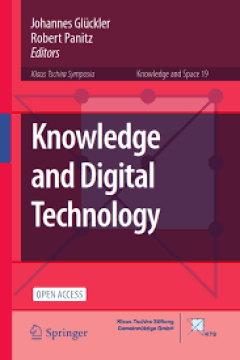
Knowledge and Digital Technology
This open access book explores the multifaceted interplay of technology, knowledge, and place. While digital technology is increasingly influencing our way of knowing, conversely it is itself the consequence of human creativity and local social interaction. Part I analyzes how digital technologies transform markets through artificial intelligence and decentralized blockchain models. Its contrib…
- Edition
- -
- ISBN/ISSN
- 978-3-031-39101-9
- Collation
- X, 289
- Series Title
- Knowledge and Space (KNAS, volume 19)
- Call Number
- 334 KNO
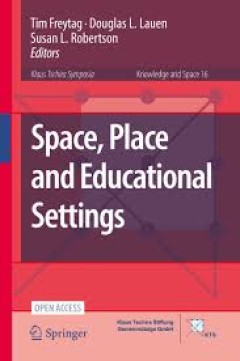
Space, Place and Educational Settings
This open access book explores the nexus between knowledge and space with a particular emphasis on the role of educational settings that are, both, shaping and being reshaped by socio-economic and political processes. It gives insight into the complex interplay of educational inequalities and practices of educational governance in the neighborhood and at larger geographical scales. The book ado…
- Edition
- -
- ISBN/ISSN
- 978-3-030-78597-0
- Collation
- X, 227
- Series Title
- Knowledge and Space (KNAS, volume 16)
- Call Number
- 334 SPA
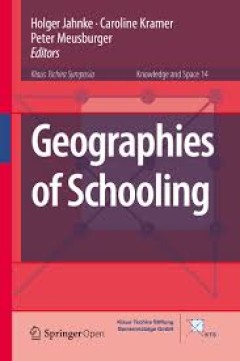
Geographies of Schooling
This open access book explores the complex relationship between schooling as a set of practices embedded in educational institutions and their specific spatial dimensions from different disciplinary perspectives. It presents innovative empirical and conceptual research by international scholars from the fields of social geography, pedagogy, educational and social sciences in Germany, the United…
- Edition
- -
- ISBN/ISSN
- 978-3-030-18799-6
- Collation
- XII, 359
- Series Title
- Knowledge and Space (KNAS, volume 14)
- Call Number
- 334 GEO
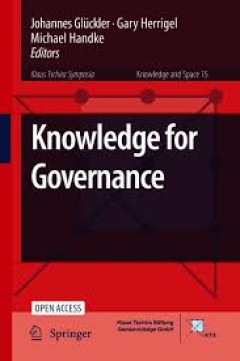
Knowledge for Governance
This open access book focuses on theoretical and empirical intersections between governance, knowledge and space from an interdisciplinary perspective. The contributions elucidate how knowledge is a prerequisite as well as a driver of governance efficacy, and conversely, how governance affects the creation and use of knowledge and innovation in geographical context. Scholars from the fields of …
- Edition
- -
- ISBN/ISSN
- 978-3-030-47150-7
- Collation
- XIII, 469
- Series Title
- Knowledge and Space (KNAS, volume 15)
- Call Number
- 334 KNO
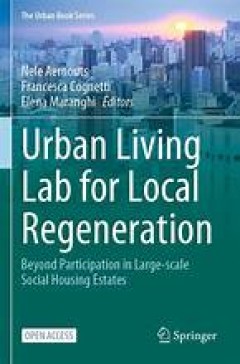
Urban Living Lab for Local Regeneration
This open access book provides an integrated overview of the challenges and resources of large-scale social housing estates in Europe and outlines possible interdisciplinary approaches and tools to promote their regeneration. It especially focuses on the tool of urban living labs, as promising in promoting new and more effective local governance and in including the different actors into the pl…
- Edition
- 1
- ISBN/ISSN
- 978-3-031-19748-2
- Collation
- oer.unej.ac.id
- Series Title
- The Urban Book Series
- Call Number
- 550
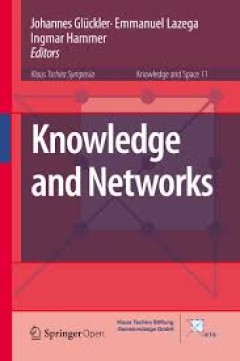
Knowledge and Networks
This open access book bridges the disciplinary boundaries within the social sciences to explore the role of social institutions in shaping geographical contexts, and in creating new knowledge. It includes theorizations as well as original empirical case studies on the emergence, maintenance and change of institutions as well as on their constraining and enabling effects on innovation, entrepren…
- Edition
- -
- ISBN/ISSN
- 978-3-319-45023-0
- Collation
- XII, 386
- Series Title
- Knowledge and Space (KNAS, volume 13)
- Call Number
- 334 KNO
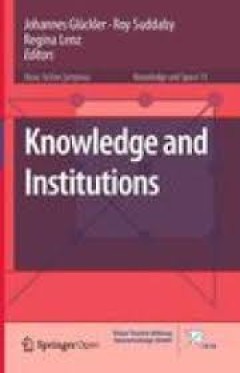
Knowledge and Institutions
This open access book bridges the disciplinary boundaries within the social sciences to explore the role of social institutions in shaping geographical contexts, and in creating new knowledge. It includes theorizations as well as original empirical case studies on the emergence, maintenance and change of institutions as well as on their constraining and enabling effects on innovation, entrepren…
- Edition
- -
- ISBN/ISSN
- 978-3-319-75328-7
- Collation
- X, 310
- Series Title
- Knowledge and Space (KNAS, volume 13)
- Call Number
- 334 KNO
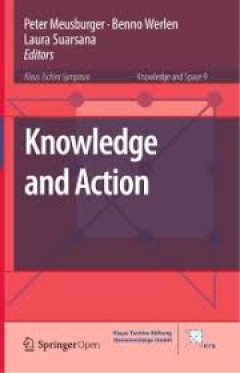
Knowledge and Action
This volume explores interdependencies between knowledge, action, and space from different interdisciplinary perspectives. Some of the contributors discuss knowledge as a social construct based on collective action, while others look at knowledge as an individual capacity for action. The chapters contain theoretical frameworks as well as experimental outcomes. Readers will gain insight int…
- Edition
- -
- ISBN/ISSN
- 978-3-319-44588-5
- Collation
- X, 300
- Series Title
- Knowledge and Space (KNAS, volume 9)
- Call Number
- 334 KNO
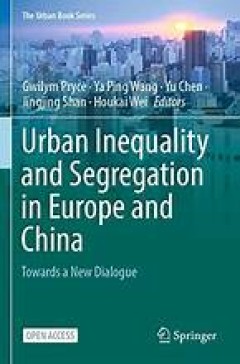
Urban Inequality and Segregation in Europe and China
This open access book explores new research directions in social inequality and urban segregation. With the goal of fostering an ongoing dialogue between scholars in Europe and China, it brings together an impressive team of international researchers to shed light on the entwined processes of inequality and segregation, and the implications for urban development. Through a rich collection of e…
- Edition
- 1
- ISBN/ISSN
- 978-3-030-74544-8
- Collation
- oer.unej.ac.id
- Series Title
- The Urban Book Series
- Call Number
- 307
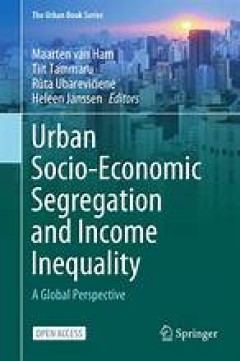
Urban Socio-Economic Segregation and Income Inequality
This open access book investigates the link between income inequality and socio-economic residential segregation in 24 large urban regions in Africa, Asia, Australia, Europe, North America, and South America. It offers a unique global overview of segregation trends based on case studies by local author teams. The book shows important global trends in segregation, and proposes a Global Segregati…
- Edition
- 1
- ISBN/ISSN
- 978-3-030-64569-4
- Collation
- oer.unej.ac.id
- Series Title
- The Urban Book Series
- Call Number
- 307
 Computer Science, Information & General Works
Computer Science, Information & General Works  Philosophy & Psychology
Philosophy & Psychology  Religion
Religion  Social Sciences
Social Sciences  Language
Language  Pure Science
Pure Science  Applied Sciences
Applied Sciences  Art & Recreation
Art & Recreation  Literature
Literature  History & Geography
History & Geography